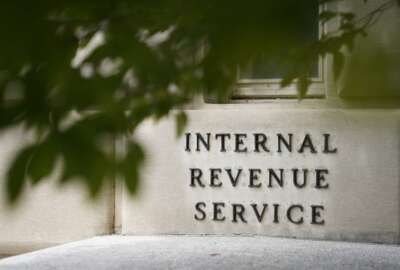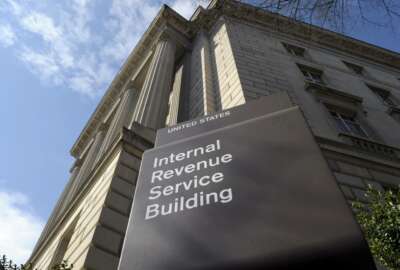

The latest tax and spending bill provides nearly $80 billion for the IRS. But that's over 10 years, more than half the money is designated for enforcement. But ...
Best listening experience is on Chrome, Firefox or Safari. Subscribe to Federal Drive’s daily audio interviews on Apple Podcasts or PodcastOne.
The latest tax and spending bill provides nearly $80 billion for the IRS. But that’s over 10 years. More than half the money is designated for enforcement. But there’s also a few billion for what the bill calls taxpayer services. For what they’re anticipating, the Federal Drive with Tom Temin turns to the president of the IRS-centered Professional Managers Association, Chad Hooper.
Interview transcript:
Tom Temin: And this all became official since we last spoke. Now, the Inflation Reduction Act is the law of the land that $80 billion, a lot of debate over that, but there is definitely hiring and beefing up of the IRS staff that’s intended under this. Some strange numbers bandied about – 87,000 people over ten years. What does it look like actually the IRS has to do now?, Let’s begin with the hiring front.
Chad Hooper: Sure, on hiring, our recruiting mission at the service has been challenged and remains so. This bill doesn’t do much to make recruiting and retention any simpler, right? We talked before about the IRS has challenges in recruiting based upon pay. And so relying on folks with a public service sort of motivation, I guess, to come to government who want to work in tax administration. In the bill, there’s funding for additional staff, and there’s this conversation around 87,000 employees. We’ve been trying to get the word out that that is a hiring projection over a decade. Over that same decade, 52,000 employees will retire. So that’s really only adding 35,000. And then of that 35,000, 20,000 are currently vacant roles that we’ve lost since 2010. So we’re really only adding 15,000 from our 2010 figure, which was the last time the IRS was fully staffed. In 2010, we weren’t able to answer all of our phone calls, we weren’t able to open all of the mail on time. And so that’s what we would be looking to, you know, sort of replenish to be sure that we can serve all of our taxpayers adequately.
Tom Temin: I’m just looking at one of the breakdowns of the bill, this is from the Tax Foundation. They said that of that $80 billion over the 10 years, 45, almost 46 of it or two-thirds of it is for what the foundation sees as enforcement. And only 9% of it is for taxpayers services. But the services is what has gotten the IRS in trouble in a way with the inspector general, For tax administration and so on, because as you say, they can’t answer the phone. So do you anticipate that that $33 billion, or $3 billion over 10 years per year can help in that area?
Chad Hooper: Yeah, enormously. So there are a couple of different ways that the funding bill will help the way that taxpayers interact with the IRS. The first is that there are some dedicated funding to enhance the personalization of taxpayer experience. There’s a 2019 piece of legislation where the IRS has been working to improve customer experience. But we have had no funding to do that. Having these four and a half billion dollars to enhance the taxpayer call experience, reduce hold times, expand our online offerings, better improve the ways that taxpayers can help themselves in their online accounts will go a long, long way to sort of drive people off of the default, which is just trying to call us to ask us a question. But there are so many ways that the tech system can be easier to interact with. Those are plans that we’ve been working on for 10 and sometimes 20 years. We just have never had the money to implement them. So that’s what that funding is for. However, there’s another 25 or more billion dollars for operations in the bill, which isn’t defined very clearly, I think in the bill texts. But that will also help us to support very vast IT improvements. And so when someone is calling the IRS right now, they’re speaking to someone who has to look into one of 60 different windows to look in your IRS account and they may not have access to all of them, they may not be trained in all of them. And so when you do get through to someone in the IRS, you’re not speaking to someone who has a full 360-degree picture of your account. That also hampers our ability to serve you well. So that IT investment that operational enhancement will go a long, long way to making the service that we do deliver a very efficient so that when you call you can get a complete answer the first time.
Tom Temin: We’re speaking with Chad Hooper, president of the Professional Managers Association of the IRS. And this question of enforcement for which there is the biggest block of money in improvement. That presumably is, as Thomas Jefferson might have said, sending agents to harass us and eat out our hard-earned fortunes or at least that’s how it’s portrayed in some circles. What do you actually anticipate, and what does it take to get someone to do enforcement for the IRS?
Chad Hooper: In an appropriation for the IRS enforcement is what we do. A lot of what we do falls in that. If you owe the IRS money, or if you get a bill from the IRS unexpectedly and you call us, the person you’re speaking to is funded out of enforcement dollars. They work in our collection function, even though you’re just speaking to someone on the phone, that’s part of that enforcement budget. The people who answer mail or issue notices when you owe us money, those are all people who work in enforcement as well. Enforcement is the largest estate within the IRS. So it’s not just people who are federal marshals that are coming with guns to seize your assets in the middle of the night. That’s a very extreme, very small and narrow section of IRS workers, they do exist. And we’ve heard some talk of them in the media, we have 2500 special agents who do very dangerous work internationally. However, generally an enforcement agent is someone who’s performing an audit in an office or in the mail or someone who has to collect taxes that are owed. And like I said, that can be someone who’s just sending you a bill in the mail, or it’s someone that you’re coming to visit in a walk-in office, or someone who’s coming to your place of business or your home, if it’s a lot of money, to help you get into a payment arrangement. What it takes to hire in those roles right now, it’s going to be a lot of folks with accounting backgrounds. Our examination function is what has suffered the most in the last 10 or 15 years of underfunding. We have about 8000 auditors who can audit out high wealth return in the entire world, out of 78,000 current working employees. And that simply isn’t enough. If we doubled that workforce to 16,000, which would allow us to audit the returns of 1600 wealthy people instead of 800 wealthy people that would help us to narrow this tax gap, which currently is $600 billion down to, you know, a more manageable number for our country.
Tom Temin: But it strikes me that the knowledge base for people in enforcement and the people in customer service is pretty similar. And so there’s the same learning curve you would have in hiring external people for whatever the function might be.
Chad Hooper: That’s exactly true. Yeah, for someone to perform an audit successfully for the IRS, for a taxpayer at any income level, it takes probably about three years to complete their training. And it’s the same for someone who completes customer service on the phone, it’s about three to four years before someone can accurately and completely serve any taxpayer who calls us. So it does take time, if we were to hire everyone we needed today, we wouldn’t be ready for four years for everyone to begin seeing the dividend that the IRS will pay. What we’d like to be able to ask folks is, you know, as we’re scaling up, and we intend to do that, in a very phased approach, it’s going to take probably the lifetime of this legislation to really see its impact.
Tom Temin: That brings up the issue that this is enabling or authorizing dollars, but it’s going to be up to each Congress over the next 10 years to actually appropriate that money. And that’s always questionable.
Chad Hooper: Ah, yeah, it sure is. And that uncertainty is something the IRS is prepared for. Unfortunately, we’re one of the agencies that is very used to having a long term plan that now we’re going to have to fight for, and we know that we’re gonna have to deliver on. That’s why Secretary Yellen and Commissioner Rettig, and PMA as a part of this conversation as well, we’re working over the next six months to put together a very robust plan so that lawmakers can see the importance of continuing to fund this bill, and why their constituents and why American taxpayers need an IRS that can function and serve them.
Tom Temin: Chad Hooper is president of the professional Managers Association at the IRS.
Copyright © 2024 Federal News Network. All rights reserved. This website is not intended for users located within the European Economic Area.
Tom Temin is host of the Federal Drive and has been providing insight on federal technology and management issues for more than 30 years.
Follow @tteminWFED


